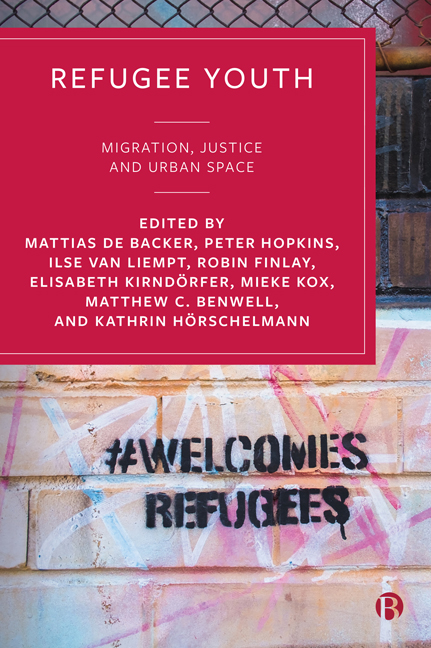Book contents
- Frontmatter
- Contents
- List of Figures and Tables
- Notes on Contributors
- Acknowledgements
- 1 Introducing Refugee Youth: Migration, Justice and Urban Space
- 2 Storying Belonging, Enacting Citizenship? (Dis)articulations of Belonging in a Community Theatre Project with Young Refugees and Asylum Seekers in Leipzig, Germany
- 3 Jackets and Jewellery: Racialised Dispossession and Struggles over Public Space in Denmark
- 4 Venezuelan Refugee Youth and Brazilian Schooling: The Individual between Languages and Spaces
- 5 The Inclusionary Potential and Spatial Boundaries of (Semi-)Public Space: Refugee Youth’s Everyday Experiences in the Urban Fabric of Amsterdam
- 6 Navigating ‘Purdah’ Culture in Urban Space: The Restricted Lives of Young Married Rohingya Refugees in Malaysia
- 7 Inclusive Urban Planning and Public Space for Refugee Youth in Pursuit of a Just City in Amman, Jordan
- 8 Sense of Belonging among Tibetan Refugees in India: A Case Study of the Bylakuppe Settlement in Karnataka, India
- 9 Negotiating Identity in Urban Space: Everyday Geographies of Syrian Students in Istanbul
- 10 ‘You’re Judged a Lot’: Australian Sudanese and South Sudanese Youths’ Perspectives on Their Experiences in Public Spaces
- 11 Hair Salons as ‘Private-Public Spaces’: Exploring the Experiences of Young Migrant Women in an Urban Township in South Africa
- 12 Emotion and Spatial Belonging: Exploring Young Migrant Men’s Emotional Geographies in Cork, Ireland
- 13 Homemaking through Music in Urban Africa: Creating Opportunities as a Refugee and a Migrant in Kinshasa and Dar es Salaam
- 14 Planetary Listening
- 15 Refugee Youth: Politics, Publicness and Visibility
- Index
14 - Planetary Listening
Published online by Cambridge University Press: 18 January 2024
- Frontmatter
- Contents
- List of Figures and Tables
- Notes on Contributors
- Acknowledgements
- 1 Introducing Refugee Youth: Migration, Justice and Urban Space
- 2 Storying Belonging, Enacting Citizenship? (Dis)articulations of Belonging in a Community Theatre Project with Young Refugees and Asylum Seekers in Leipzig, Germany
- 3 Jackets and Jewellery: Racialised Dispossession and Struggles over Public Space in Denmark
- 4 Venezuelan Refugee Youth and Brazilian Schooling: The Individual between Languages and Spaces
- 5 The Inclusionary Potential and Spatial Boundaries of (Semi-)Public Space: Refugee Youth’s Everyday Experiences in the Urban Fabric of Amsterdam
- 6 Navigating ‘Purdah’ Culture in Urban Space: The Restricted Lives of Young Married Rohingya Refugees in Malaysia
- 7 Inclusive Urban Planning and Public Space for Refugee Youth in Pursuit of a Just City in Amman, Jordan
- 8 Sense of Belonging among Tibetan Refugees in India: A Case Study of the Bylakuppe Settlement in Karnataka, India
- 9 Negotiating Identity in Urban Space: Everyday Geographies of Syrian Students in Istanbul
- 10 ‘You’re Judged a Lot’: Australian Sudanese and South Sudanese Youths’ Perspectives on Their Experiences in Public Spaces
- 11 Hair Salons as ‘Private-Public Spaces’: Exploring the Experiences of Young Migrant Women in an Urban Township in South Africa
- 12 Emotion and Spatial Belonging: Exploring Young Migrant Men’s Emotional Geographies in Cork, Ireland
- 13 Homemaking through Music in Urban Africa: Creating Opportunities as a Refugee and a Migrant in Kinshasa and Dar es Salaam
- 14 Planetary Listening
- 15 Refugee Youth: Politics, Publicness and Visibility
- Index
Summary
In the public imagination, refugees and migrants appear rather than speak. A stock range of visual cliches are evidence of the looming threat of human movement and migration. The news coverage unthinkingly recycles a whole repertoire of all-too-predictable images from boats crowded to sinking point, young faces trapped behind barbed wire fences or dead bodies of children tragically washed up on beaches. These pitiable portraits of abject displacement stand in the place of the important task of what I would call hospitable attention and listening. Martin Luther King Jr argued that pity is distancing. He wrote: ‘Pity is feeling sorry for someone; empathy is feeling sorry with someone. Empathy is fellow feeling’ (1968, p 119). What Refugee Youth: Migration, Justice and Urban Space offers is the opportunity to develop a different relationship to these young lives documented within it, based on ‘fellow feeling’, to offer an unspectacular human portrayal of young people seeking freer lives.
The completion of this collection has coincided with Russia's invasion of Ukraine. The violence of war once provided the impetus for the young to run from it. What we have seen is that the kind of ‘fellow feeling’ that Martin Luther King Jr talked about is damaged and shaped by the legacy of racism that shapes empathy and familiarity. Writing in the British newspaper, The Daily Telegraph, on 26 February 2022, Daniel Hannan commented: ‘They [the displaced Ukrainians] seem so like us. That is what makes it so shocking. Ukraine is a European country. Its people … watch Netflix and have Instagram accounts, vote in free elections and read uncensored newspapers. War is no longer something visited upon impoverished and remote populations.’ Being like ‘us’ – that is white Europeans in this context – is viewed as a natural empathy. This is not a product of nature but the result of the long history of European racism that conveys a greater value on some human beings than on others.
Nadine White, commenting in the British newspaper, The Independent, on 1 March 2022, on the contrast between the coverage of the war in Ukraine and that of the conflicts in Syria and in Afghanistan, points out, ‘From France to the UK and the US, much of the media coverage of the war in Ukraine has been saturated with racial bias.’
- Type
- Chapter
- Information
- Refugee YouthMigration, Justice and Urban Space, pp. 225 - 230Publisher: Bristol University PressPrint publication year: 2023



